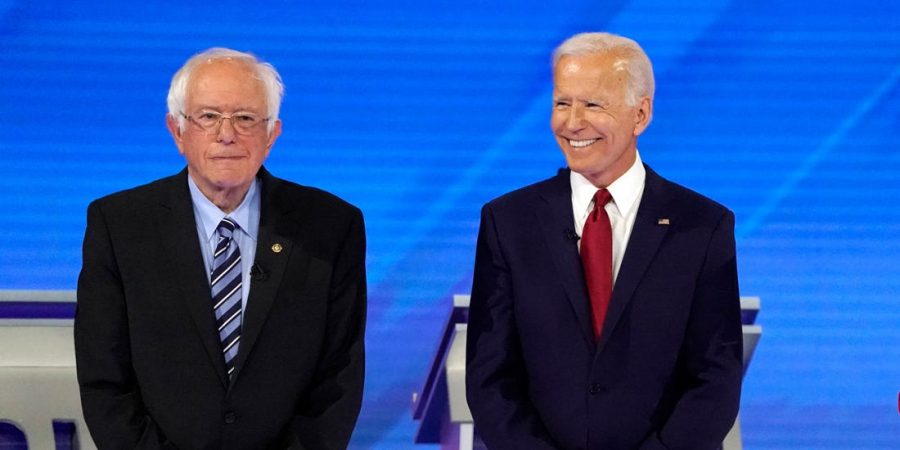Bernie Sanders and Joe Biden: What’s their stance on the subject of cannabis reform in the U.S.?
Two candidates stand a chance at going head-to-head with the current President of the United States, Donald Trump, in November — former Vice President Joe Biden and Sen. Bernie Sanders (I-VT). Since they’re both Democrats, there’s a lot to be said on the subject of cannabis legalization in the U.S.
Biden, who served eight years alongside President Barack Obama, does not think recreational legalization would be worthwhile. Sanders, on the other hand, has been a long-time cannabis advocate. Since 68 percent of Democrats support legal weed initiatives, it’s pretty clear which politician would get this political party’s vote. Nonetheless, contrasting opinions on the subject of cannabis reform in the U.S. means that either Democrat’s victory could significantly shape the nation’s cannabis industry in the future.
An overview of each presidential candidate’s view on cannabis legalization in the U.S.
While it remains uncertain as to which presidential candidate will gain the majority vote, we can make predictions based on what each politician is prepared to do in regards t0 cannabis reform in the U.S.:
Bernie Sanders’ view on U.S. cannabis reform
Let’s begin with U.S. Senator Sanders, who is in favor of adult-use cannabis legalization. The 78-year-old pushed for policy change in 2015. It was during this time that he submitted a federal legalization bill; the first Senate bill of its kind. Sanders intends on rolling out an already-prepared plan for cannabis legalization in the U.S., should he be elected as president. He is also a fan of medical cannabis legalization; the politician previously cosponsored a House bill to legalize and regulate medicinal weed, which he believes is a suitable alternative to over-the-counter (OTC) opioids.
While Sanders hasn’t been keen on prospective cannabis decriminalization, he has vowed to expunge prior cannabis convictions for those impacted by the “war on drugs” — a focal point of his restorative justice plan. He also backs social equity measures that would simplify participation in the nation’s cannabis industry for the residents of underprivileged communities, in addition to states’ rights to legalize, the rescheduling of cannabis, personal consumption, and safe consumption sites for illegal drugs.
Joe Biden’s view on cannabis reform in the U.S.
It’s safe to say that Biden isn’t batting for the legal bud quite like Sanders is. So much so, in fact, that his views represent what is likely to be a significant divide among voters. Notwithstanding his slightly more prohibitionist approach to cannabis reform in the U.S., the Democratic party member isn’t completely against the idea. While he doesn’t approve of adult-use cannabis legalization, medical cannabis legalization is on the agenda.
In regards to decriminalization, Biden hasn’t clarified whether or not this would be a key goal of his. It should be noted, however, that the Democratic politician rigorously enforced anti-drug laws when he was serving as a senator. As more Democratic voters become supportive of legal weed initiatives, Biden is – perhaps reluctantly – starting to champion cannabis reform.
Conclusion
Based on differences in opinion between the two presidential election candidates, it’s likely that Sanders will get the vast majority of votes from pro-cannabis supporters nationwide. Sanders – in addition to supporting various aspects of cannabis reform in the U.S. – plans on issuing an executive order to legalize cannabis in all 50 states during his first day in-office. The order would be effective immediately.
Executive action of this kind is not likely to be offered by Biden, therefore Biden would be the man to vote for among prohibitionist Americans. Considering the fact that Sanders has been one of the longest-serving politicians to push for cannabis reform in the U.S., he’s already got a lot of joint and tincture-wielding fans.
A 2016 report by the Tax Foundation predicted that a “mature [cannabis] industry could generate up to $28 billion in tax revenues for federal, state, and local governments, including $7 billion in federal revenue: $5.5 billion from business taxes and $1.5 billion from income and payroll taxes.” With the industry having grown significantly since 2016 – 33 states have now legalized for medical purposes and 11 for recreational use – a federally-legal industry could very well be worth more than the Foundation’s initial estimates.










